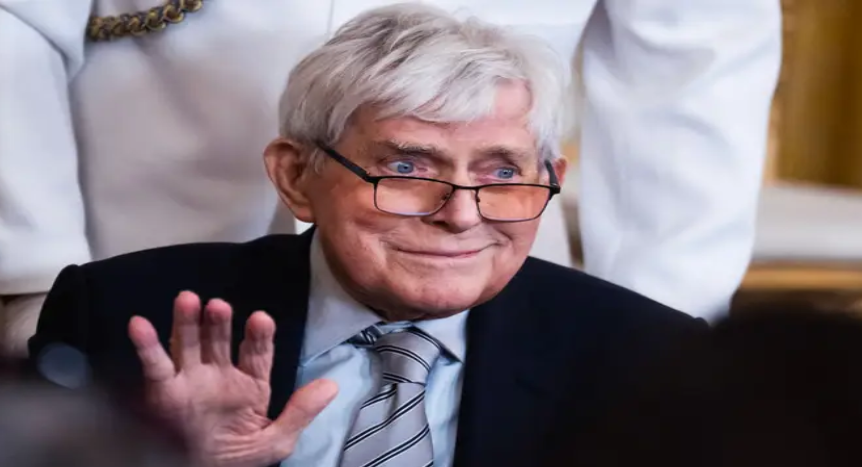“Remembering Phil Donahue, Whose Innovative Approach Redefined Television Talk Shows”
Phil Donahue: The Legacy of a Television Pioneer
Phil Donahue, the trailblazing figure behind the iconic Donahue show, passed away on August 18 at the age of 88 after a prolonged illness. His groundbreaking work not only captivated millions but also shaped the landscape of daytime television in profound ways. Donahue’s family announced his peaceful passing at his home, surrounded by loved ones including his wife of 44 years, actress Marlo Thomas, his sister, children, grandchildren, and his cherished golden retriever, Charlie.
Discover more articles on USA Elects
A Career Defined by Courage and Innovation
Born on December 21, 1935, in Cleveland, Ohio, Phil Donahue began his career in the late 1950s, venturing into the realms of talk radio and television. In 1967, he launched The Phil Donahue Show in Dayton, Ohio, a show that would later simply be known as Donahue. This program not only won multiple Emmy Awards but also earned a reputation for tackling controversial topics head-on—a rarity at the time.
Donahue’s show was the first of its kind to allow audience members to pose questions to guests, creating a dynamic and interactive atmosphere that was previously unseen on TV. His daring approach included a memorable week-long series broadcast directly from an Ohio state penitentiary, pushing the boundaries of journalistic exploration.
Transformative Years in Chicago and Beyond
In 1974, Donahue moved his show to Chicago, which marked a pivotal shift in its trajectory. According to Ron Weiner, former director of Donahue, it was the interaction with the Chicago studio audience that truly propelled the show to new heights. Phil himself acknowledged the serendipitous nature of this interaction, noting, “One day, I just went out in the audience, and it’s clear there would be no Donahue show if I hadn’t somehow accidentally brought in the audience.”
The show’s relocation to New York City in January 1985 continued this innovative streak. Broadcasting live from 30 Rockefeller Plaza, Donahue engaged with a wide array of guests, from politicians and activists to musicians and actors, continually setting new standards for what a talk show could achieve.
A Global Influence and Lasting Impact
Phil Donahue’s influence extended beyond American borders. In January 1987, he made television history by taping five episodes in the Soviet Union, showcasing his commitment to fostering global dialogue. His interview with Nelson Mandela in March 1990, shortly after Mandela’s release from prison, marked another significant milestone, bringing pivotal global figures to American audiences.
Phil’s commitment to substantive, unfiltered discourse was exemplified in a 1992 televised debate he hosted between Democratic presidential contenders Bill Clinton and Jerry Brown Jr., which was conducted without an audience, moderator, or commercial breaks, highlighting his dedication to pure, unmediated conversation.
Honoring Donahue’s Legacy
In lieu of flowers, Donahue’s family has requested that donations be made to St. Jude Children’s Research Hospital or the Phil Donahue/Notre Dame Scholarship Fund, reflecting his lifelong commitment to philanthropy.
Phil Donahue’s legacy as a pioneer of the daytime talk show format is indelible. His fearless approach to discussing tough issues, his ability to connect with audiences, and his unending curiosity have left an enduring mark on television journalism. As we remember Donahue, we celebrate the profound impact of his work and the paths he paved in media—a fitting tribute to a man who believed deeply in the power of conversation.

